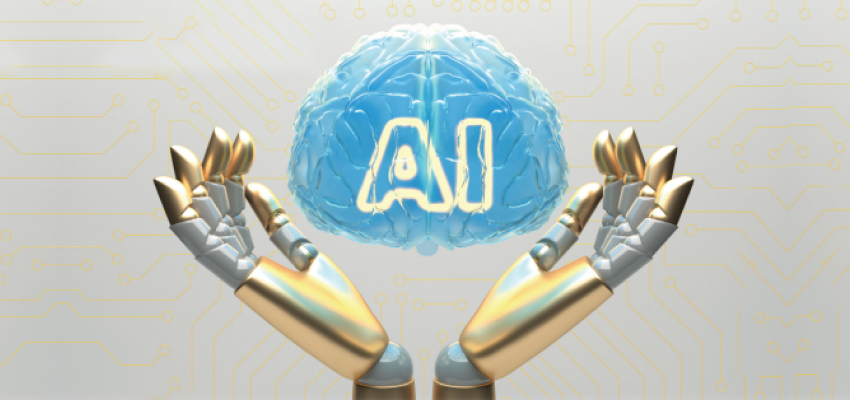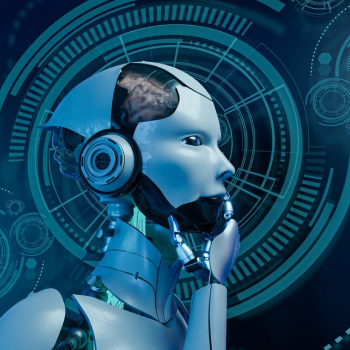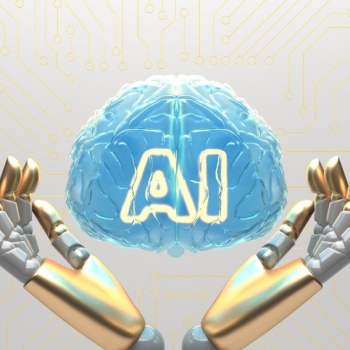AI—a new paradigm

Just as humanity has moved from the Stone Age to Modern Age through discovery and innovation, and progressed through the use of science and technology, we are now on the brink of being swept along by Artificial Intelligence (AI), which basically is machine processing of data and patterns to give human-like responses at supersonic speeds—it is transforming the way we work, live and interact. A formidable tool that can amplify human creativity and ingenuity, it is no substitute for human intelligence, but only if we harness it wisely
Human life and technology are inseparable. The history of human civilisation is directly correlated with the evolution of science, technology and innovation. Even in the Stone Age, primitive men developed stone equipment for hunting. In later periods, they used farming equipment made with metals like iron. The great discovery of fire, and its generation and control, led people to cook and have a settled home instead of wandering and hunting for food. Modern Age started with the industrial revolution in the 18th century. Initially, this revolution centred in Britain and because of this, Britain became a super power.

Innovation and science spread gradually to different parts of the world and that heralded the dawn of modern living. Then came a long list of technological advancements like the computer, mobile phones, internet, which virtually rule our lives today. The progress of science and technology continues to uplift our lives, and now the latest is ‘Artificial Intelligence (AI)’. There is a tremendous buzz about AI and all big technological companies in the world are in the race to develop AI applications.
What is AI? It is the simulation of human intelligence processed by machines, especially computer systems. In simple words, it is the intelligence exhibited by a machine. Specific applications of AI include expert systems, natural language processing, speech recognition and machine vision. It requires a foundation of specialised hardware for writing and training machine learning algorithms. No single programming language is synonymous with AI, but Python, R, Java, C++ and Julia have features popular with AI developers. In general, AI systems work by ingesting large amounts of labelled training data, analysing the data for correlations and patterns, and using these patterns to make predictions about future states. In this way, a chatbot that is fed examples of text can learn life-like exchanges with people, or an image recognition tool can learn to identify described objects in images by reviewing millions of examples. Now, rapidly improving generative AI techniques can create realistic text, images, music and other media. AI programming focuses on cognitive skills that include learning, reasoning, self-correction and creativity.
AI is important for its vast potential. It can change how we live, work and play. It has effectively been used in business to automate tasks done by humans. In a number of areas it can perform tasks much better than humans, particularly when it comes to repetitive, detail-oriented tasks, such as analysing a large number of legal documents. AI tools often complete jobs quickly and with relatively very few errors.
Applications of AI
AI has already made its way into a wide variety of markets in a short time. A few of them are:
-
Healthcare: The biggest bets are on improving patient outcomes and reducing costs. Machine Learnings are applied for better and faster medical diagnosis than by humans. The system mines patient data and other available data sources to form hypotheses for doctors to work from.
-
Business: Machine learning algorithms are being integrated into analytics and customer relationships management (CRM) platforms to uncover information for better service to customers. Chatbots are being used for immediate service to customers.
Education:: AI helps educators save time on jobs like grading of students and helping in student tutoring. Educators are helped in crafting course work and teaching materials.
-
Finance:: It is being used for personal finance applications and also in stock market tradings.
Law: Labour intensive analysing of legal documents is taken over. Even the line of arguments before the courts is suggested by AI, based on analysis of case records.
-
Entertainment and media: Creating scripts, targeted advertisements, detecting frauds etc., are issues on which AI is used. Automated journalism
-
Software coding and IT processes: It can be used to produce application code based on natural language prompts. It can also automate many IT processes.
-
Security: AI techniques are being successfully used for multiple aspects of cybersecurity
-
Manufacturing: Robots earlier used for single tasks are now being used for multi tasks with AI. Cobots are taking the place of robots.
-
Banking: Banks are using chatbots for customer services and even helping in transactions, which do not require human intervention.
-
Transportation: It is used to manage traffic, predict flight delays and make ocean shipping safer and more efficient.
"The progress of science and technology continues to uplift our lives, and now the latest is ‘Artificial Intelligence (AI)’. There is a tremendous buzz about AI and all big technological companies in the world are in the race to develop AI applications"
AI has both advantages and disadvantages. It has also ethical challenges.
Some advantages:
- Good at detail oriented jobs
- Saves labour and increases productivity
- Delivers consistent results
- Can improve customer satisfaction through personalisation
- AI-powered virtual agents are always available
Some disadvantages:
- Expensive
- Requires deep technical expertise
- Limited supply of qualified workers to build AI tools
- Reflects the biases of its training data, its scale
- Lack of ability to generalise from one task to another
- Eliminates human jobs and this adds to unemployment
Ethical Challenges:
- Bias due to improperly trained algorithms and human bias
- Misuse due to deepfakes and phishing
- Legal concerns, including AI linked and copyright issues
- Data privacy concerns
Mighty tool
Artificial Intelligence is a very productive innovation. This may change our work culture. It is a testimony of the growing human mind, as it will work as an associate of the mind itself. This will serve as a tool of future technologies. But where there is good, there is a bad connect too. The bad gets harvested out of all the good due to the human mind working on the evil path. Terrorists, blackmailers, smugglers and such other people can misuse a good technological innovation. Cybercrimes are going up and AI is negatively working in this area. Ironically, there are not many rules and regulations present in the world today to control the menace. In the last few months alone, money to the tune of `7061 crores have been lost by Indians from reported cybercrimes, with roots discovered that led to China.
There’s good, there’s bad

The creation of AI by technologists is not bad but it is the human operators of evil intention who create problems. It is something like the discovery of atomic energy. It has the good side of producing pollution free nuclear energy but it also has the other side of producing atom bomb for the massacre of human lives on a very large scale. The car is a good asset for human convenience, but a careless driver can cause accidents resulting in loss of lives. We cannot decry a medicine for its side effects, and similarly we cannot accuse AI for its wrong use. Technologists should apply their minds to create a way to detect the wrong use of AI and nip it in the bud. Policy makers globally have to wake up fast to bring harsh laws to punish the evil doers. The world has to unite for this as evil operators are globally spread and they may not be from the country where the crime is committed. We must remember what scientist Einstein said, “It has become appallingly obvious that our technology has exceeded our humanity.” The human spirit must prevail over technologies. The real danger is not that computers will begin to think like men, but that men will begin to think like computers. We have to ensure that the servant, who we bring as a technological asset, does not become our executioner.
AI is not a substitute for human intelligence; it is a tool to amplify human creativity and ingenuity. The great physicist Stephen Hawking said, “Success in creating AI would be the biggest AI event in human history. Unfortunately, it might also be the last, unless we learn how to avoid the risks.” ChatGPT which is an application of AI has become hugely successful and popular in a short time, and that shows the power of AI.